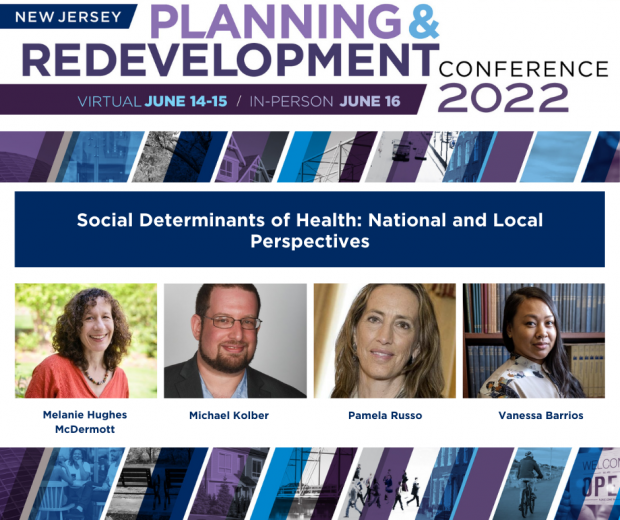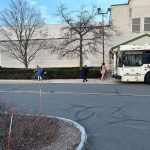New Jersey Future Blog
Social Determinants of Health: National and Local Perspectives
July 11th, 2022 by Jyoti Venketraman
 Social determinants of health are the conditions in which people are born, grow, live, work, and age that shape their health and well-being. In other words, these are the non-medical factors that impact health outcomes. Social determinants of health include traditional planning domains such as transportation, housing, green spaces, and social domains like good schools and access to good jobs.
Social determinants of health are the conditions in which people are born, grow, live, work, and age that shape their health and well-being. In other words, these are the non-medical factors that impact health outcomes. Social determinants of health include traditional planning domains such as transportation, housing, green spaces, and social domains like good schools and access to good jobs.
At the 2022 NJ Planning and Redevelopment Conference, co-hosted by New Jersey Future and the New Jersey Chapter of the American Planning Association, a session titled “Social Determinants of Health: National and Local Perspectives” examined and addressed racial and health inequities through planning, policy, community organizing, and culture change by showcasing national and local perspectives. Speakers included Vanessa Barrios, the manager of Advocacy Programs at Regional Plan Association; Michael Kolber, senior planner for the City of Trenton; and Melanie Hughes McDermott, senior researcher with Sustainable Jersey at the Sustainability Institute at The College of New Jersey. The session was moderated by Pamela Russo, senior program officer at the Robert Wood Johnson Foundation.
“Social determinants of health provide an opportunity for planners to have an expanded scope when it comes to redevelopment. In order to achieve sustainability one must incorporate equity.” said Pamela Russo, setting the stage for the session, and inviting viewers into this vital conversation.
Panelist Vanessa Barrios showcased the national perspective on how the Regional Plan Association (RPA) has integrated this lens of social determinants of health. In her presentation and comments, Barrios explained, “Health is integral to well-being. Racial justice, health equity are very vital to regional planning.” Barrios went on to stress how planners make vital decisions that shape the built environment, which in turn impacts the health and wellbeing of all communities. Using the example of RPA’s Healthy Regions Planning Association, Barrios showcased work happening nationally in 10 regions. The regions are exploring how race and racism impacts the built environment through planning, and seek to center community voices in their design process of planning. One takeaway Barrios shared was how by intentionally centering the voices of impacted communities, health equity can be integrated into regional planning to improve health outcomes.
Panelist Melanie Hughes shared a state-level perspective, highlighting Sustainable Jersey’s Gold Star in Health standard, a voluntary program for NJ municipalities. To obtain a Gold Star in Health certification, towns must use existing data, engage multi-sector stakeholders, and connect the dots between social determinants of health and potential action solutions, like access to green spaces and safe streets. Hughes shared that through their work with the Gold Star program, intersection of health and housing, Sustainable Jersey includes housing as an action area, developing a suite of actions that promote healthy housing, with a particular focus on lead poisoning.
Panelist Michael Kolber highlighted the local perspective of the City of Trenton, which was the first city in 2021 to have a Community Health and Wellness plan as part of its master plan. Kolber explained, “Everything in Trenton revolves around our master plan—housing and land use, public safety, arts and culture, [and] health.” Trenton’s Community Health Plan includes many goals, such as increasing access to food, increasing physical activity, improving access to health care, and focusing on seniors, to name a few. Trenton’s planning and zoning meetings use this health plan as part of land use applications review to determine whether the plan relates or justifies development. Decisions like removing grocery store barriers, permitting primary care facilities in all land zones, exploring equitable distribution of parks, and addressing barriers to parks that some face were shared as examples of how community health plans enable integration of health equity in planning decisions at the local level.
The panel and the discussion brought up common themes that were shared across the examples highlighted, including the vital role of cross-sector partnerships, building cross-sector consultative grassroots work, intentionally centering the voices of impacted communities in planning, and learning from past mistakes to rebuild trust. As billions of dollars for infrastructure investment begin flowing into communities across the nation, healthier and more equitable communities can be achieved when racial and health inequities are addressed through planning, policy, community organizing, and cultural change.
Related Posts
Tags: accessibility, community, green spaces, health, healthy, Housing, Places to age, sustainability, sustainable, Transportation
















